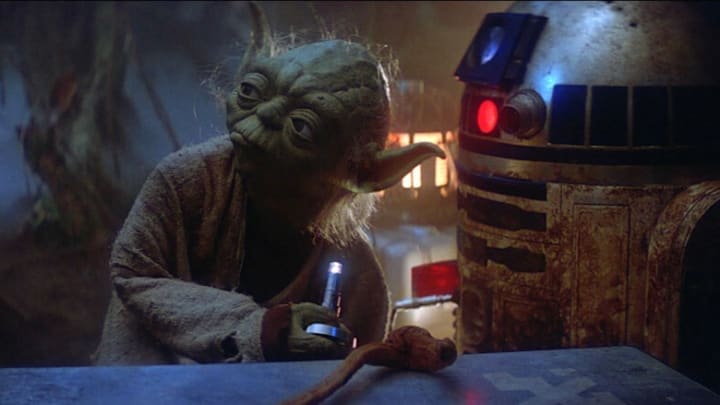For all of the fast-paced heroics and bold adventures of the Star Wars universe, all of the Skywalker films are centered around a spiritual quest that forms the psychological core of the characters' arcs. It's not just Luke Skywalker and Leia Organa who have brushes with a "sad devotion to [an] ancient religion." Even Han Solo says of the Force, "It's true. All of it." Today, let's look into one of the most memorable moments of development in the original trilogy.
"No different. Only different in your mind."
One of my favorite classroom experiences involved a scene from Star Wars Episode V: The Empire Strikes Back. I was in training to be a missionary, and our teacher decided to show us an example of how to teach people to move past what they naturally believe. Instead of pulling up a traditional sermon or quoting verses, he cued up a DVD and let Yoda do the talking for him. We watched as Luke earnestly tried to exercise the power that he had been developing and found himself unable to do the task of lifting his stuck X-wing fighter from the swamp near Yoda's home.
By the end of the scene, we were all nodding in understanding. A geeky friend of mine objected to the teacher shutting off the movie before Luke exclaimed, "I don't believe it," and Yoda diagnosed, "And that is why you failed." We could perfectly understand what it was like to have faith fall short of what looked like a miracle. The great lessons of that scene had nothing to do with seeing an X-wing draped in weeds and dripping swamp water. They were in the ideas taught before Luke gave up on making things float with his mind.
I watched this scene as part of religious training, but it doesn't have to be restricted to anything like that. Every person lives a life molded by a belief of some kind. It goes by names such as confidence, trust, faith, and conviction. Luke isn't wrong about practical matters when he says, "Master, moving stones around is one thing, but this is... totally different." It's a matter of degrees and scale, and Luke is too mired in weights and measures.

But the Force isn't meant to be understood by mathematical equations or things out of a physics textbook. George Lucas codified a biological element to the mystical when he talked about midi-chlorians, but it is absolutely essential to remember that Yoda is a powerful Jedi based on an intangible principle:
"For my ally is the Force, and a powerful ally it is. Life creates it, makes it grow. Its energy surrounds us and binds us. Luminous beings are we not this crude matter. You must feel the Force around you, here, between you, me, the tree, the rock, everywhere, yes. Even between the land and the ship."Master Yoda
Luke is often seen as an everyman since he comes from humble beginnings and works hard for his success. He uses the Force to destroy the Death Star. However, he was already a great pilot because of years of flying skyhoppers in Beggar's Canyon on Tatooine and after relying on his instruments and fellow pilots to guide him through the Battle of Yavin. We can relate to Luke in this scene because Yoda really does "want the impossible."
In Star Wars Episode IX: The Rise of Skywalker, there is a scene that is a companion to this great moment of cinema. Luke, who just one movie before had to be taught that "the greatest teacher failure is," admits that "I was wrong. It was fear that kept me here." Luke has taken time in the afterlife to learn a life lesson. In a moment that proves how far he's come since Dagobah, he tells Rey that, "Confronting fear is the destiny of a Jedi." Then, we hear Yoda's theme and see Luke's X-wing emerge, but this time, the doubting Skywalker has learned to trust the Force and lift the ship from the water.
"You have that power, too."
I want to end this love letter to trust by returning to how it applies to those of us who don't know our midi-chlorian counts. Yoda is asking Luke to trust in himself as much as he is expecting him to believe in the power of the Force. That is arguably the reason behind his question, "Hear you nothing that I say?" There are times in all of our lives when we can only accomplish great things by putting our trust in what seems nonsensical.
The hero's journey is a framing device for great storytelling, but it often overlooks the fact we don't have to be involved in an epic quest of some kind to do great things. Ambition and aspiration are not dirty words but have the potential to call us to be more "luminous beings." When we unlearn what we have learned, we can find the courage to change the world, teach others, commit to passions, and find light in the darkness. Most importantly, we can believe in the principles of the Force when we "are calm, at peace."
It's easier said than done, but it's only when we don't believe it that we truly fail.
